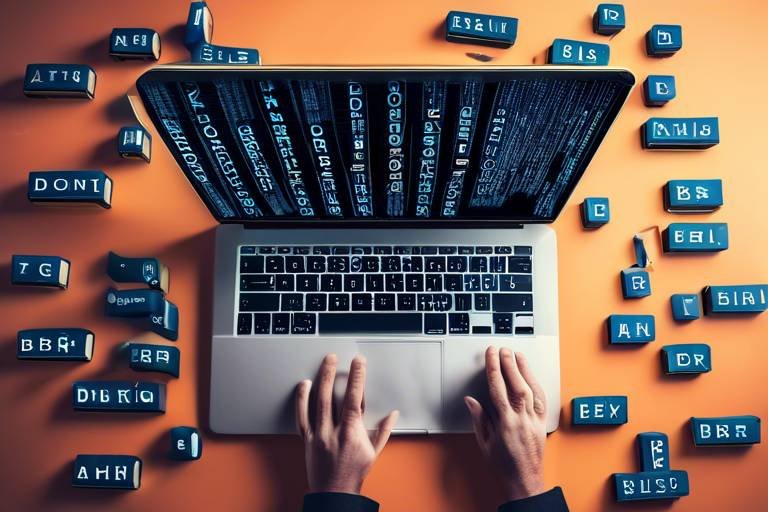How Blockchain is Changing the Future of Remote Work
In today’s fast-paced world, the concept of work is evolving at an unprecedented rate. With the rise of remote work, traditional office settings are becoming a thing of the past. Enter blockchain technology, a game-changer that is not just a buzzword but a revolutionary force reshaping how we think about work. Imagine a workplace where distance is irrelevant, where teams can collaborate seamlessly, and where trust is built into every transaction. Sounds futuristic, right? Well, it's happening now! This article explores the transformative impact of blockchain technology on remote work, highlighting its benefits, challenges, and future potential in creating a decentralized and efficient work environment.
The rise of decentralized workforces marks a significant shift in how teams operate. No longer confined by geographical boundaries, companies are now embracing a more flexible approach to staffing. With blockchain, the barriers to collaboration are crumbling. It facilitates seamless communication, allowing team members from different corners of the globe to work together as if they were in the same room. Picture a digital workspace where every contribution is recorded and accessible in real-time, enhancing accountability and engagement. This decentralization not only fosters innovation but also empowers employees to take ownership of their work, leading to greater job satisfaction and productivity.
In the realm of remote work, security is not just an option; it’s a necessity. With sensitive data being exchanged across various platforms, the risk of breaches and unauthorized access looms large. This is where blockchain technology steps in as a knight in shining armor. By utilizing a decentralized ledger, blockchain ensures that data integrity is maintained and that sensitive information is protected. Each transaction is encrypted and linked to the previous one, creating an unchangeable record that is nearly impossible to tamper with. So, when you share a document or a contract with your team, you can rest assured that it’s safe and sound.
Now, let’s talk about smart contracts. These are not your typical agreements scribbled on a piece of paper; they are self-executing contracts with the terms of the agreement directly written into code. Imagine a world where you don’t have to chase down signatures or worry about whether someone will hold up their end of the bargain. Smart contracts automate agreements and transactions, streamlining workflows and ensuring that everyone is on the same page. They enhance transparency and efficiency, making remote work arrangements smoother than ever. If a task is completed, the payment is automatically released, eliminating delays and disputes.
Miscommunication can be a productivity killer, especially in remote settings where face-to-face interactions are limited. Blockchain's clear record-keeping minimizes misunderstandings, fostering better collaboration among remote teams. With a transparent history of all interactions and transactions, team members can easily refer back to previous discussions and agreements. This clarity not only reduces friction but also builds a culture of trust and accountability. After all, when everyone knows what to expect, collaboration becomes a breeze!
One of the most exciting aspects of blockchain technology is its ability to simplify payment processes for remote workers. Imagine being a freelancer who completes a project and receives instant payment, regardless of where your client is located. Blockchain enables secure, instant payments across borders, enhancing financial efficiency for both freelancers and companies. Traditional payment methods can be slow and costly, often involving hefty fees and delays. With blockchain, these barriers are eliminated, allowing for a more fluid and dynamic financial ecosystem.
Trust is the bedrock of any successful team, and it’s even more critical in remote work settings. Blockchain fosters trust through transparent processes and verifiable credentials. Imagine being able to verify a colleague's qualifications or a contractor's past work without having to take their word for it. With blockchain, every credential is securely stored and easily accessible, strengthening team dynamics. This transparency not only builds trust but also enhances collaboration, as team members feel more confident in one another’s abilities and contributions.
While the benefits of blockchain in remote work are compelling, it’s essential to acknowledge the challenges of implementation. Integrating this technology into existing workflows can be daunting, and organizations must address several potential obstacles. From technical complexities to regulatory concerns, the road to successful adoption is not without its bumps. However, with the right strategies and a willingness to adapt, companies can harness the power of blockchain to revolutionize their remote work practices.
One of the primary hurdles in implementing blockchain technology is the technical barrier. Many organizations may find themselves lacking the necessary skills or technological infrastructure to utilize blockchain effectively. This skills gap can hinder progress and prevent teams from fully reaping the benefits of this innovative technology. To overcome this, companies must invest in training and development, ensuring that their workforce is equipped to navigate the blockchain landscape.
Navigating the legal landscape surrounding blockchain can also be a complex endeavor. Regulatory issues can complicate its use in remote work, as laws and regulations vary significantly from one jurisdiction to another. Organizations must stay informed about compliance challenges to avoid potential pitfalls. By proactively addressing these concerns, companies can better position themselves for successful blockchain integration and capitalize on its advantages.
- What is blockchain technology? Blockchain is a decentralized digital ledger that records transactions across multiple computers securely and transparently.
- How does blockchain enhance remote work? It facilitates secure communication, automates agreements through smart contracts, and simplifies payment processes.
- What are the challenges of implementing blockchain? Technical barriers and regulatory concerns are two significant challenges organizations face when adopting blockchain technology.

The Rise of Decentralized Workforces
In today's fast-paced world, the concept of work is undergoing a radical transformation. Gone are the days when employees were tethered to a single desk in a corporate office. Instead, we are witnessing the emergence of decentralized workforces, where teams collaborate from various corners of the globe, leveraging technology to break down traditional barriers. This shift is not just a trend; it’s a revolution fueled by advancements in blockchain technology. Imagine a world where your colleagues are not just in the same building but are scattered across continents, yet still work together seamlessly. That's the promise of decentralization.
At the heart of this transformation is blockchain, which provides the infrastructure that allows for secure communication and collaboration. Think of blockchain as a digital ledger that records transactions across many computers, ensuring that the information is transparent and immutable. This technology empowers teams to work together effectively, regardless of geographical boundaries. With tools that utilize blockchain, teams can share information in real-time, ensuring everyone is on the same page. It’s like having a virtual office that never sleeps, where ideas can flow freely and collaboration knows no limits.
Moreover, decentralized workforces are not just about flexibility; they also promote inclusivity. Companies can now tap into a global talent pool, allowing them to hire the best talent without the constraints of location. This means that a skilled developer in India can work alongside a marketing expert in Brazil, creating a rich tapestry of skills and perspectives. The result? Enhanced creativity and innovation that can propel businesses forward. However, this new landscape is not without its challenges, and that’s where blockchain shines even brighter.
Blockchain enables a level of transparency that was previously unattainable. For instance, when teams use blockchain-based tools, every contribution is recorded in a way that is easily verifiable. This clarity helps to eliminate doubts and fosters a culture of accountability. Imagine working on a project where every team member can see the progress in real-time, reducing the chances of miscommunication and misunderstandings. It’s like having a crystal-clear window into the workflow, allowing everyone to stay aligned and focused on their goals.
In addition to enhancing collaboration, blockchain also supports the management of decentralized workforces through smart contracts. These self-executing contracts automate agreements, ensuring that all parties adhere to the terms without the need for intermediaries. This not only streamlines workflows but also reduces the potential for conflicts. It’s akin to having a digital referee that ensures everyone plays by the rules, making remote work smoother and more efficient.
As we continue to embrace this decentralized model, it’s essential to acknowledge the role of technology in facilitating these changes. With blockchain at the forefront, organizations can create a more dynamic and responsive work environment. The future of work is here, and it’s decentralized, interconnected, and driven by innovation. As we navigate this exciting new landscape, the possibilities are endless, and the potential for growth is immense.
- What is a decentralized workforce? A decentralized workforce refers to a team of employees who work from various locations rather than a single office, often enabled by technology.
- How does blockchain support decentralized workforces? Blockchain provides secure communication, transparency, and automation through smart contracts, facilitating collaboration among remote teams.
- What are the benefits of decentralized work? Benefits include access to a global talent pool, enhanced creativity, improved accountability, and reduced miscommunication.

Enhanced Security and Privacy
In the digital age, where remote work has become the norm rather than the exception, security and privacy have emerged as paramount concerns for both employers and employees. With sensitive information being shared across various platforms, the risk of data breaches and unauthorized access looms larger than ever. This is where blockchain technology steps in as a game-changer, offering unprecedented levels of security and privacy that traditional systems simply cannot match.
At its core, blockchain operates as a decentralized ledger that records transactions across many computers, ensuring that the data is immutable and transparent. This means that once a piece of information is entered into the blockchain, it becomes nearly impossible to alter or delete, providing a robust audit trail that can be invaluable in a remote work setting. Imagine a scenario where every interaction, every contract, and every payment is logged in a way that is both secure and accessible. This not only bolsters trust among team members but also significantly reduces the risk of fraud and data tampering.
One of the standout features of blockchain technology is its ability to encrypt data. Each transaction is secured with cryptographic techniques, making it incredibly difficult for hackers to breach. For remote teams that rely heavily on digital communication tools, this level of encryption is essential. By leveraging blockchain, organizations can ensure that sensitive information, such as personal identification details, financial records, and proprietary data, remains confidential. This is especially crucial when teams are spread across different geographical locations, often using various devices and networks that may not be secure.
Moreover, blockchain enhances privacy through its use of public and private keys. In a blockchain network, users are assigned unique cryptographic keys that allow them to access their data without revealing their identity. This means that employees can collaborate and share information without the fear of exposing their personal details. Think of it as having a secure mailbox where only you hold the key. This level of privacy fosters a sense of safety, encouraging open communication and collaboration among remote teams.
To further illustrate the impact of blockchain on security and privacy in remote work, consider the following table:
| Feature | Traditional Systems | Blockchain Technology |
|---|---|---|
| Data Integrity | Vulnerable to tampering | Immutable records |
| Encryption | Basic encryption methods | Advanced cryptographic techniques |
| Identity Protection | Risk of identity theft | Public/private key system |
| Audit Trails | Difficult to trace | Transparent and accessible |
As organizations continue to embrace remote work, the importance of adopting technologies that enhance security and privacy cannot be overstated. Blockchain not only addresses these challenges but also empowers teams to work more efficiently and confidently. By creating a secure and private environment, companies can focus on what really matters—collaboration, innovation, and productivity.
In conclusion, the intersection of blockchain and remote work is paving the way for a future where security and privacy are not just afterthoughts but integral components of the work experience. As we move forward, it’s essential for businesses to consider how they can leverage this technology to protect their most valuable assets—their people and their data.
- How does blockchain ensure data security? Blockchain uses cryptographic techniques to secure data, making it nearly impossible for unauthorized users to access or alter it.
- Can blockchain be used for all remote work environments? While blockchain offers significant benefits, its implementation may vary depending on the specific needs and infrastructure of an organization.
- What are the costs associated with implementing blockchain? The costs can vary widely based on the complexity of the system and the level of customization required, but many organizations find the investment worthwhile for enhanced security.

Smart Contracts in Remote Work
In the rapidly evolving landscape of remote work, smart contracts are proving to be a game-changer. These self-executing contracts, with the terms of the agreement directly written into code, eliminate the need for intermediaries and streamline workflows. Imagine a world where agreements are automatically executed without the hassle of back-and-forth negotiations or the risk of human error. That's the power of smart contracts! They not only enhance efficiency but also bring a level of transparency that traditional contracts simply cannot match.
When teams are spread across different time zones and locations, the ability to automate processes becomes crucial. Smart contracts can facilitate various aspects of remote work, from project management to payment processing. For instance, when a freelancer completes a task, a smart contract can automatically trigger payment, ensuring that they are compensated fairly and promptly. This instant payment feature is particularly beneficial for remote workers who often face delays in receiving their earnings. By using blockchain technology, these transactions are not only fast but also secure, reducing the risk of fraud and disputes.
Additionally, smart contracts can help in managing project milestones. Consider a scenario where a remote team is working on a software development project. The project can be divided into phases, each with its own set of deliverables. A smart contract can be programmed to release payments only when specific milestones are achieved and verified. This creates a win-win situation: clients are assured that they only pay for completed work, while freelancers have a clear understanding of what is expected of them.
However, the implementation of smart contracts is not without its challenges. Organizations must ensure that all parties involved have a clear understanding of the contract terms to avoid any potential disputes. Moreover, the legal status of smart contracts can vary by jurisdiction, which adds another layer of complexity. Companies need to be aware of these factors and consider seeking legal advice to navigate the murky waters of blockchain regulations.
To summarize, smart contracts are revolutionizing the way remote teams operate by providing a transparent, efficient, and secure method of managing agreements and transactions. As more organizations embrace this technology, we can expect to see a significant shift in how remote work is conducted, ultimately leading to a more decentralized and empowered workforce.
- What is a smart contract? A smart contract is a self-executing contract with the terms of the agreement directly written into code, allowing for automated execution without intermediaries.
- How do smart contracts enhance remote work? They streamline processes like payment and project management, ensuring efficiency and transparency in remote collaborations.
- Are there legal issues associated with smart contracts? Yes, the legal status of smart contracts can vary by jurisdiction, and organizations should consider legal advice for compliance.
- Can smart contracts reduce payment delays for freelancers? Absolutely! Smart contracts can automate payments, ensuring freelancers are paid promptly upon task completion.

Reducing Miscommunication
In the fast-paced world of remote work, miscommunication can feel like a sneaky thief, stealing time and productivity from teams. Imagine trying to build a puzzle with pieces that don’t fit together; that’s often what it feels like when team members are on different pages. However, blockchain technology is stepping in as a powerful ally in the quest to minimize these misunderstandings. By providing a clear, immutable record of transactions and communications, blockchain creates a transparent environment where everyone can access the same information simultaneously.
One of the primary ways blockchain reduces miscommunication is through its decentralized ledger. Every transaction, whether it’s a completed task, a shared document, or a payment, is recorded on the blockchain and is visible to all authorized parties. This means that team members can refer back to the same source of truth whenever they need clarity. No more relying on memory or scattered emails that can easily be misinterpreted! Instead, the blockchain acts like a well-organized library where everyone can find the information they need, when they need it.
Additionally, the use of smart contracts further enhances communication by automating agreements and ensuring that all parties are aware of their responsibilities. For instance, if a freelancer completes a project, a smart contract can automatically trigger payment upon verification of the work done. This not only eliminates the need for back-and-forth discussions about payment terms but also fosters a sense of accountability among team members. When everyone knows what to expect and when, it significantly reduces the chances of miscommunication.
Moreover, the transparency provided by blockchain can help in identifying and addressing potential misunderstandings before they escalate. When every action is recorded and visible, it becomes easier to spot discrepancies in communication. For example, if a team member claims they weren't informed about a deadline change, the blockchain can quickly show when and how that information was shared. This level of transparency not only resolves disputes but also builds a culture of trust within the team.
To sum it up, blockchain technology acts as a powerful tool in the remote work arsenal, reducing miscommunication through:
- Decentralized records that provide a single source of truth.
- Smart contracts that automate agreements and clarify roles.
- Transparent communication that fosters accountability and trust.
By leveraging these features, remote teams can enhance their collaboration, ensuring that everyone is aligned and working towards common goals. In a world where effective communication is crucial for success, blockchain stands out as a game-changer, turning the tide against miscommunication and paving the way for a more productive and harmonious work environment.
- What is blockchain technology? Blockchain is a decentralized digital ledger that records transactions across many computers securely and transparently.
- How does blockchain improve remote work? It enhances communication, ensures data integrity, and automates processes through smart contracts.
- Can blockchain be integrated with existing tools? Yes, many blockchain solutions are designed to integrate with popular project management and communication tools.
- What are the challenges of using blockchain in remote work? Challenges include technical barriers, regulatory concerns, and the need for training and education.

Facilitating Payment Processes
In the ever-evolving landscape of remote work, the need for quick, secure, and efficient payment processes has never been more critical. Traditional payment systems often involve delays, high fees, and a maze of regulations that can frustrate both employers and remote workers. Enter blockchain technology, which is revolutionizing how payments are made and received across the globe. Imagine a world where freelancers and companies can transact without the usual headaches of intermediaries and lengthy waiting periods. Sounds appealing, right?
Blockchain facilitates this by enabling instantaneous payments through decentralized networks. When a remote worker completes a project, they can receive their payment immediately, rather than waiting days for a bank transfer or dealing with the high costs associated with traditional payment platforms. This not only enhances the financial experience for freelancers but also improves cash flow for businesses. With blockchain, the funds are transferred directly from the employer to the employee, eliminating the need for a third-party service that often charges exorbitant fees.
To illustrate the efficiency of blockchain payments, consider the following comparison between traditional payment methods and blockchain transactions:
| Payment Method | Transaction Time | Fees | Cross-Border Capability |
|---|---|---|---|
| Traditional Bank Transfer | 1-5 business days | High (varies by bank) | Limited |
| Payment Platforms (e.g., PayPal) | Instant to a few hours | Moderate (up to 5% per transaction) | Yes, but with fees |
| Blockchain Transactions | Minutes | Minimal (often less than 1%) | Yes, globally |
As shown in the table above, blockchain transactions not only provide speed but also significantly reduce costs, making them an attractive option for both freelancers and companies. Furthermore, the transparency of blockchain ensures that all parties involved can track the payment process in real-time, which builds a sense of trust and accountability.
Moreover, the ability to conduct cross-border payments seamlessly is a game changer for remote work. Imagine a graphic designer in Brazil getting paid by a startup in Germany without worrying about currency conversions or hefty international fees. Blockchain removes the barriers that often accompany international transactions, allowing for a truly global workforce.
In conclusion, the facilitation of payment processes through blockchain not only streamlines financial transactions but also empowers remote workers by providing them with timely access to their earnings. This efficiency fosters a more productive work environment, where talent can thrive without the constraints of outdated financial systems. The future of remote work is bright, and blockchain is at the forefront, paving the way for a more connected and efficient global workforce.

Building Trust in Remote Teams
Trust is the bedrock of any successful team, but when you're working remotely, it can sometimes feel like trying to catch smoke with your bare hands. You don’t have the luxury of face-to-face interactions, and the nuances of body language can be lost in the digital ether. However, blockchain technology is emerging as a powerful ally in fostering trust among remote teams. By providing a transparent and immutable record of transactions and communications, blockchain helps to create a culture of accountability and reliability.
Imagine a world where every action taken by a team member is recorded in a secure, tamper-proof ledger. This is precisely what blockchain offers. With its decentralized nature, blockchain ensures that all team members have access to the same information, reducing the chances of misunderstandings and miscommunications. When everyone can see the same data, it becomes much easier to trust that everyone is on the same page. This transparency is crucial in a remote work environment where team members may never meet in person.
Moreover, blockchain allows for the verification of credentials and work completed, which is essential for building trust. For instance, if a freelancer submits a project, blockchain can provide a verifiable record of the work's completion and the agreed-upon terms. This eliminates any doubt about whether the work was done as promised. It’s like having a digital badge of honor that proves your contributions, making it easier for team members to recognize and appreciate each other's efforts.
Another fascinating aspect of blockchain is the concept of smart contracts. These are self-executing contracts with the terms of the agreement directly written into code. Smart contracts automatically enforce and execute agreements when conditions are met, thus removing the need for intermediaries. This not only speeds up the workflow but also enhances trust. For example, if a project milestone is reached, the smart contract can automatically release payment to the freelancer without any manual intervention. This level of automation mitigates the risk of delays or disputes, further solidifying trust within the team.
In a remote setting, where team members may feel isolated, the assurance that their contributions are recognized and rewarded can significantly boost morale and motivation. When employees know they can rely on transparent processes and verifiable outcomes, they are more likely to engage fully in their work. As a result, trust is not just a nice-to-have; it becomes a fundamental part of the remote work culture.
However, it’s essential to recognize that building trust through blockchain is not a one-size-fits-all solution. Organizations must also foster a culture of open communication and collaboration. While blockchain provides the tools for transparency, it’s the human element—regular check-ins, feedback loops, and team-building activities—that truly solidifies trust among remote teams. After all, technology can facilitate trust, but it’s the relationships that ultimately sustain it.
In conclusion, as remote work continues to evolve, leveraging blockchain technology offers a unique pathway to building trust within teams. By ensuring transparency, automating processes, and recognizing contributions, blockchain not only enhances efficiency but also creates a more cohesive and trustworthy work environment. So, as we move forward into this new era of remote work, let’s embrace the potential of blockchain to strengthen our teams and foster a culture of trust.
- How does blockchain enhance trust in remote teams?
Blockchain provides a transparent and immutable record of transactions, ensuring that all team members have access to the same information, which fosters accountability. - What are smart contracts?
Smart contracts are self-executing contracts with the terms directly written into code, which automatically enforce agreements when conditions are met. - Can blockchain completely eliminate miscommunication?
While blockchain enhances transparency, it’s crucial to combine it with open communication practices to effectively reduce miscommunication. - Is blockchain technology suitable for all remote teams?
Blockchain can benefit many remote teams, but organizations must assess their specific needs and capabilities before implementation.

Challenges of Implementing Blockchain
While blockchain technology holds immense potential for transforming remote work, it’s not without its challenges. Organizations looking to adopt this innovative system face a myriad of hurdles that can complicate the integration process. One of the primary concerns is the technical barriers that come with implementing blockchain solutions. The technology itself can be complex, and many companies may struggle with the skills gap in their workforce. Not all employees are familiar with blockchain, and the need for specialized training can lead to increased costs and extended timelines for deployment.
Moreover, the technological infrastructure required to support blockchain is not always readily available. Businesses may need to invest in new hardware and software, which can be daunting, especially for smaller companies. It’s like trying to build a high-tech spaceship without having the right tools or knowledge; the vision is there, but the execution can be a daunting task.
Another significant challenge is the regulatory concerns surrounding blockchain technology. The legal landscape is still evolving, and many organizations are unsure how to navigate the myriad of regulations that can affect their operations. For instance, data privacy laws vary significantly from one jurisdiction to another, which can complicate how companies handle sensitive information on a blockchain. This uncertainty can deter organizations from fully committing to blockchain solutions, as they fear potential legal repercussions.
Additionally, the lack of standardized regulations can create an uneven playing field. Companies that are quick to adopt blockchain might find themselves at a disadvantage if competitors are able to circumvent regulations more effectively. This creates a sense of hesitation among businesses, as they weigh the benefits of blockchain against potential compliance risks.
In summary, while the benefits of blockchain for remote work are compelling, organizations must carefully consider the challenges of implementation. From addressing technical barriers and investing in the necessary infrastructure to navigating the complex regulatory landscape, the road to adopting blockchain can be fraught with difficulties. However, with proper planning and a commitment to overcoming these obstacles, companies can unlock the transformative potential of blockchain technology in their remote work environments.
- What are the main challenges of implementing blockchain in remote work? The main challenges include technical barriers, regulatory concerns, and the need for specialized training and infrastructure.
- How can organizations overcome the technical barriers of blockchain? Organizations can invest in training programs, hire blockchain experts, and gradually integrate blockchain solutions to manage the complexity.
- What regulatory issues should companies be aware of when adopting blockchain? Companies should stay informed about data privacy laws and compliance requirements that vary across jurisdictions.

Technical Barriers
When we talk about blockchain technology and its integration into remote work, we can't ignore the that come into play. It's like trying to fit a square peg into a round hole; while the potential is immense, the actual implementation can be a bit tricky. One of the primary challenges is the skills gap. Many organizations lack the necessary expertise to effectively deploy and manage blockchain systems. This technology isn’t just a plug-and-play solution; it requires a deep understanding of decentralized networks, cryptography, and smart contracts. Without the right talent, companies may find themselves lost in a sea of technical jargon and complex setups.
Moreover, the technological infrastructure needed to support blockchain can be daunting. Organizations must invest in robust hardware and software systems to handle the demands of blockchain technology. This can lead to significant upfront costs, which may deter smaller companies from jumping on the blockchain bandwagon. It's not just about having the right tools; it's also about ensuring that these tools can communicate effectively with existing systems. Imagine trying to teach an old dog new tricks; it takes time, patience, and sometimes a complete overhaul of your approach.
Additionally, the interoperability of blockchain systems is another hurdle that organizations face. With various blockchain platforms available, ensuring that they can work together seamlessly is crucial. If your team is using one type of blockchain for project management and another for payment processing, you might end up with silos of information that don't communicate with each other. This fragmentation can lead to inefficiencies and a lack of cohesion in team efforts.
In summary, while blockchain offers exciting possibilities for remote work, the are substantial. Organizations must be prepared to tackle these challenges head-on. They need to invest in training, infrastructure, and interoperability solutions to truly harness the power of blockchain technology. The journey may be complex, but the rewards can be well worth the effort.
- What are the main technical barriers to implementing blockchain in remote work?
The main barriers include the skills gap, the need for robust technological infrastructure, and interoperability issues among different blockchain systems. - How can organizations overcome the skills gap?
Organizations can invest in training programs, hire blockchain consultants, or collaborate with educational institutions to build a knowledgeable workforce. - Is blockchain technology expensive to implement?
Yes, the initial investment can be high due to the need for specialized hardware and software, but the long-term benefits may justify the costs.

Regulatory Concerns
The integration of blockchain technology into remote work environments brings with it a host of that organizations must navigate carefully. As exciting as blockchain is, it operates in a complex legal landscape that varies significantly across different jurisdictions. For many businesses, understanding the regulatory framework surrounding blockchain is akin to trying to solve a Rubik's Cube—challenging and often frustrating.
One of the primary regulatory concerns is the lack of uniformity in laws governing blockchain technology. Different countries have different rules regarding data protection, cryptocurrency transactions, and smart contracts. For instance, while some nations embrace blockchain and cryptocurrencies, others impose strict regulations or outright bans. This inconsistency can create a significant barrier for companies looking to adopt blockchain solutions for their remote teams.
Additionally, organizations must be wary of compliance issues that can arise from using blockchain. Compliance with existing laws, such as the General Data Protection Regulation (GDPR) in Europe, poses unique challenges. The immutable nature of blockchain means that once data is recorded, it cannot be easily altered or deleted, which conflicts with the right to be forgotten under GDPR. This creates a dilemma for companies: how do you leverage the benefits of blockchain while ensuring compliance with stringent data protection laws?
Moreover, there are security regulations that companies must adhere to, especially when dealing with sensitive data or financial transactions. Failure to comply with these regulations can result in hefty fines and legal repercussions. Organizations must invest in understanding these regulations and possibly seek legal counsel to ensure they are on the right side of the law.
To illustrate the complexity of the regulatory landscape, consider the following table that summarizes various regions and their stances on blockchain technology:
| Region | Regulatory Stance | Key Regulations |
|---|---|---|
| United States | Mixed | SEC guidelines, state laws |
| European Union | Restrictive | GDPR, MiFID II |
| China | Restrictive | Ban on ICOs, strict crypto regulations |
| Switzerland | Supportive | FINMA guidelines |
With all these factors in play, it’s clear that organizations must tread carefully when integrating blockchain into their remote work strategies. Engaging with legal experts and staying informed about regulatory changes is crucial for any company wishing to leverage blockchain technology effectively and legally.
- What are the main regulatory challenges of using blockchain in remote work? - The main challenges include compliance with data protection laws, varying regulations across jurisdictions, and security regulations that must be adhered to.
- How can companies ensure they are compliant with blockchain regulations? - Companies can ensure compliance by consulting with legal experts, staying updated on regulatory changes, and implementing robust data protection measures.
- Are there any regions that are more blockchain-friendly than others? - Yes, regions like Switzerland have supportive regulations for blockchain technology, while others like China impose strict restrictions.
Frequently Asked Questions
- How does blockchain enhance remote work collaboration?
Blockchain technology creates a decentralized environment where teams can collaborate seamlessly, regardless of their physical locations. By providing a transparent and secure platform, it minimizes communication barriers and allows for real-time updates, ensuring everyone is on the same page.
- What are smart contracts and how do they benefit remote workers?
Smart contracts are self-executing contracts with the terms of the agreement directly written into code. They automate processes, reducing the need for intermediaries, which streamlines workflows and enhances transparency. For remote workers, this means quicker payments and fewer disputes over contract terms.
- How does blockchain ensure data security for remote teams?
Blockchain enhances data security through its decentralized nature, which makes it nearly impossible for unauthorized users to alter or access sensitive information. Each transaction is recorded on a secure ledger, ensuring data integrity and protecting against breaches.
- What challenges might organizations face when implementing blockchain?
Organizations may encounter several challenges, including technical barriers such as a lack of skilled personnel and the need for robust technological infrastructure. Additionally, navigating the regulatory landscape can be complex, as compliance with legal standards varies across regions.
- How can blockchain help in building trust among remote teams?
Blockchain fosters trust by providing a transparent record of all transactions and interactions. This verifiable information allows team members to have confidence in each other's work and commitments, thereby strengthening team dynamics and collaboration.
- Are there any regulatory concerns related to using blockchain in remote work?
Yes, regulatory concerns can complicate the adoption of blockchain technology in remote work. Organizations must be aware of the legal requirements surrounding data protection, financial transactions, and other compliance issues that may arise from using blockchain solutions.
- What are the financial benefits of using blockchain for remote payments?
Blockchain simplifies payment processes by enabling instant and secure transactions across borders. This reduces transaction fees and eliminates the need for currency conversion, making it more financially efficient for freelancers and companies alike.



















